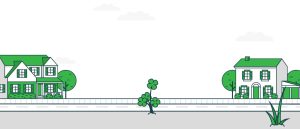Pennsylvanians can experience many types of hazardous seasonal weather, from Nor’easters to hurricanes, that can cause substantial property damage. These homeowners often opt for a homeowners insurance policy to ensure their protection.
Key Takeaways:
- On average, homeowners insurance in Pennsylvania costs about $1,499 annually.
- Pennsylvanians aren’t required by law to have a home insurance policy.
- Allstate and Erie are the top insurers in the Keystone State.
How Much Is Homeowners Insurance in Pennsylvania?
The average cost of homeowners insurance in Pennsylvania is $1,499 for $300,000 of dwelling coverage. You may pay more or less than this, depending on how much insurance you need and several other factors.
According to the latest census, over two-thirds of people own their homes in Pennsylvania. This success and effort shouldn’t go unprotected, which is why wise homeowners invest in homeowners insurance.
The brief home insurance price index for Pennsylvania below illustrates how average rates can change based on your dwelling coverage, which is the largest property coverage in home insurance policies. Typically, the more dwelling coverage you need, the more you’ll pay for insurance.
| Dwelling Coverage | $200,000 | $300,000 | $400,000 |
|---|---|---|---|
|
Annual Premium |
$1,093 | $1,499 | $1,872 |
Pennsylvania house insurance policies include six coverages labeled A-F. As shown above, dwelling coverage, or Coverage A, is a major part of your policy. However, there are five more coverages that contribute to your protection.
These coverages describe different ways your policy protects you. Each coverage area often has a separate dollar limit.
Coverage A: Dwelling — As we touched on earlier, dwelling coverage is the part of your plan that financially protects the physical structure of your house. This includes your roof, walls, floor, windows, and patios. It also covers the “guts” of your home, like your electrical wiring, HVAC, plumbing, and more.
Dwelling coverage is the largest property coverage you’ll have in your plan, so it’s one of the most substantial policy factors in determining Pennsylvania homeowners insurance rates. Your dwelling coverage should be at least enough to cover your home’s replacement cost fully.
Coverage B: Other Structures — Other structures coverage protects features and fixtures on your property that aren’t attached to your house. These include fences, sheds, detached garages, pools, and more.
Your other structures limit is normally 10% of your dwelling coverage limit. So, if you have $300,000 of dwelling coverage, you’d likely have $30,000 of other structures coverage.
Coverage C: Personal Property — Personal property coverage in Pennsylvania property insurance is for your personal belongings. Furniture, electronics, art, tools, clothes, and more fall under personal property coverage.
You determine the amount of personal property coverage you want. Providers may give you a default option of setting your limit at 50% of your dwelling coverage, but you can adjust this depending on how much you need to cover your items sufficiently. The best way to know how much personal property coverage you need is to conduct and maintain a home inventory.
With an above-average personal property limit, you may struggle to find cheap home insurance in Pennsylvania.
Coverage D: Loss of Use — Loss of use coverage only applies when you’re forced to move out of your home after a covered loss. Your insurer can cover expenses you incur while they’re fixing your home, such as costs for a hotel, groceries, gas, and more. A standard loss of use limit is around 20% of your dwelling coverage.
Coverage E: Personal Liability — Personal liability coverage protects you if someone pursues your finances after getting injured on your property. Personal liability coverage can cover associated medical bills and legal fees if a visitor gets injured on your property and you’re found liable.
Insurers typically require you to carry at least $100,000 of liability coverage in your policy, but most will recommend at least $300,000 or more. You can adjust your liability coverage easily and with relatively little effect on your premiums.
Coverage F: Medical Payments — Medical payments coverage is similar to personal liability coverage, but it’s designated only for minor injuries. Where you might use liability coverage to cover a major slip and fall or dog bite claim, for instance, you would use medical payments coverage to cover someone getting a few stitches.
Medical payments limits are in the thousands of dollars, while personal liability limits are in the hundreds of thousands.
It’s crucial to note that these are the coverages that appear on policies that insure standard, single-family homes, like HO-3, HO-5, and HO-8 policies. If you’re looking for coverage for a non-standard home construction, like mobile home insurance in Pennsylvania, your policy (HO-7) may look different.

It’s Time to Switch Your Homeowners Insurance
We partner with the nation’s top homeowners insurance companies so you can get a custom policy at an affordable price.
The Best Home Insurance Companies in Pennsylvania Explained
The best Pennsylvania home insurance companies will offer the coverage you need at a price that works for you. State Farm, Erie, Progressive, Farmers, and Liberty Mutual are the largest companies in the Keystone State. But, these are far from the only options. There are over 200 licensed providers that sell policies in the state.
Because so many factors influence rates and coverage needs, the best choice for you may not be the best choice for someone else when it comes to choosing a provider. This is why shopping around for homeowners insurance is crucial.
Everyone is usually concerned about price first. You always want the best bang for your buck. But, keep in mind that cheap homeowners insurance in Pennsylvania isn’t always the best. You want to compare rates, but you also want to compare available coverage options, endorsements, discounts, and customer service experiences.
Companies That Offer the Cheapest Homeowners Insurance in Pennsylvania
Knowing which providers offer the cheapest home insurance in Pennsylvania is always a good start in deciding which insurer is right for you. Based on our table below, Erie and Allstate homeowners insurance in Pennsylvania have some of the lowest rates. These are average rates based on $300,000 in dwelling coverage, so your quote from one of these providers may vary based on many factors.
| Company | Average Premium |
|---|---|
|
Allstate |
$1,228 |
|
Erie |
$1,196 |
|
Farmers |
$1,284 |
|
Nationwide |
$1,439 |
|
Travelers |
$3,585 |
|
State Farm |
$1,522 |
As shown in the table above, many companies in the Keystone State offer rates near the state average of $1,499 annually. Notably, State Farm homeowners insurance in Pennsylvania offers the closest average rate to the state average. While many of the companies represented on this table are larger, national insurers, there are plenty of small, regional insurers in the state, too.
Erie insurance in Pennsylvania is a standout pick for low rates and for those seeking insurance from a local insurer. Erie is based in Erie, Pennsylvania, which may put this insurer at a distinct advantage for insuring Pennsylvanians, as they’re aware of the land and the unique perils these homeowners face.
Additionally, getting low rates from these companies may be even easier, considering some of them are the best home and auto insurance companies in Pennsylvania. Companies that offer several insurance products often offer a discount for those who chose to bind another policy with the same insurer, which is called bundling.
What Does the Best Homeowners Insurance in Pennsylvania Look Like?
The best home insurance in Pennsylvania will cover your property and liability sufficiently. You may need to raise your coverage limits or purchase optional endorsements for the best coverage.
For instance, you may have the option of actual cash value or replacement cost coverage in your personal property coverage. Actual cash value will factor in depreciation when reimbursing you for your items, while replacement cost does not. Replacement cost will generally pay you what you paid for an item, regardless of age. You may want to find an insurer that has this option at an affordable rate depending on your home inventory.
Additionally, getting one of the best policies for house insurance in Pennsylvania may also mean fitting your most valuable items into your policy adequately. Personal property coverage has sub-limits for high-value items like art, memorabilia, jewelry, and more. You can schedule these things with some insurers, which qualifies them for complete coverage at an additional cost.
Depending on your property history, location, and more, you may also be interested in some optional riders. Some of the top-rated home insurance companies in Pennsylvania offer sinkhole, water backup, ordinance or law, and other optional endorsements that you might be interested in to create the best policy for you.
In fact, sinkholes are quite common in the Keystone State because the makeup of the state’s terrain is more susceptible to be dissolved by natural acids than most other terrains. Those interested in additional protection for this peril can add sinkhole insurance in Pennsylvania to their existing home insurance policy.
There’s a lot to keep in mind when shopping for homeowners insurance. Many consumers need help figuring out where to start, especially if they’re buying their first home or switching carriers after a long time with one company.
Below, we’ve answered some common Pennsylvania homeowners insurance questions regarding price factors and requirements. We also explained some home insurance rules and regulations you might want to know.
What Affects the Average Home Insurance Cost in Pennsylvania?
As we mentioned earlier, homeowners insurance in Pennsylvania cost factors vary, some of which you can control while others you can’t. So, if your rates don’t match the average rate in the state of $1,499 annually, know that insurance companies must consider a myriad of variables to determine your rate accurately.
Some factors that affect the rates of average homeowners insurance in Pennsylvania are:
- Home location
- Home age
- Home features
- Policy deductible
- Claims history
Although Pennsylvania has no coastline along the Atlantic, the state can still experience effects from hurricanes and tropical storms. This is evidenced as recently as 2021, when remnants of Hurricane Ida made their way into the state and, notably, the Delaware Valley. Ida caused substantial flooding and damage, and spawned separate tornadoes.
Every Pennsylvania insurance company will check to see if your home is in an area more prone to hurricane, tornado, or flooding damage. If so, you will likely pay higher premiums to offset this potential risk or you may have to bind a separate policy for protection from all of these perils. Luckily, the cost of flood insurance in Pennsylvania isn’t very high.
Your home’s age and features also influence your rates. Older houses are inherently riskier since they may not be up to the latest building and safety codes. And, they tend to have more issues that lead to claims, like old roofs.
Features of your property that can increase your rates include pools, trampolines, wood-burning stoves, outdated wiring, and polybutylene pipes.
You choose your deductible when you get your insurance policy. Raising your deductible can lower your premiums, while choosing a low deductible — which puts your insurance company on the hook for more damage – can raise your rates. You can see how your rates are affected when using a homeowners insurance in Pennsylvania calculator, otherwise known as a quoting tool.
Having a history of filing home insurance claims can raise your rates, too. When shopping for coverage, providers will ask if you’ve filed any claims in the past three to five years. Insurers will likely charge you higher rates if you’ve filed several claims recently since you’re more likely to file again than someone who has never filed.
Do I Need Flood Insurance in Pennsylvania?
With Nor’Easters, hurricanes, and more frequent and severe heavy rainfall, Pennsylvanians have a lot of wet weather to worry about. Unfortunately, flood damage isn’t covered by homeowners insurance. so homeowners need to seek a separate Pennsylvania flood insurance policy for protection against this peril. Luckily, here at Clovered, we can help you find the cheapest flood insurance in Pennsylvania.
Depending on where you live, you may be at a higher risk of experiencing flood damage than other residents in the state. Here’s what you need to know about your FEMA flood zone.

Stay Above Water With Flood Insurance
Do you want to pay for costly and common flood damage yourself or have an insurance policy pick up the tab?
Is Homeowners Insurance Mandatory in Pennsylvania?
No, Pennsylvania homeowners insurance laws don’t require homeowners to maintain a policy. But, mortgage lenders can require their homeowners to get and maintain coverage for the life of the loan. If you don’t have a mortgage, no one will require you to have a home insurance plan.
Lenders mandate homeowners insurance to protect their investments in your property. You would still have to pay off your home loan if your house got destroyed. Your homeowners insurance enables you and your lender to recoup the money you spent on your property from the insurance company in case of serious damage.
If you don’t keep home insurance for the life of your loan, your lender can force place insurance on you. Force-placed insurance is inadequate coverage at exceptionally higher homeowners insurance in Pennsylvania estimates. It isn’t a good idea to have force-placed insurance, and you should avoid it by choosing your own coverage and paying your premiums on time.
Additionally, failing to maintain a policy may make it harder to get another policy on the standard homeowners insurance market. After lapsing or being dropped by your insurer, you may need to seek FAIR plan insurance in Pennsylvania.
The Pennsylvania FAIR plan, or Fair Access to Insurance Requirements plan, is a government-funded insurance plan homeowners can bind as a last-resort option. They’re generally very costly and should be avoided if possible.
How to Get Homeowners Insurance Quotes in Pennsylvania
Getting Pennsylvania home insurance quotes is easy with Clovered. You can get a quote entirely online and compare your options with several providers.
If you have questions or need any help along the way, our team of licensed agents would love to assist you. We’re available by phone at 833-255-4117 during business hours, or you can email us at agent@clovered.com.
The editorial content on Clovered’s website is meant to be informational material and should not be considered legal advice.

 Average Homeowners Insurance Rates in Pennsylvania
Average Homeowners Insurance Rates in Pennsylvania